Ioannina & Meteora, Greece, June 2021
After Patra (Peloponnese peninsula), we crossed back onto the mainland of Greece and drove northwards in Greece until about 30 miles south of Albania, we stopped to check out the town of Ioannina, where we had planned to stay a couple of days. Some scenes along the drive northwards from Patra.
First stop was in Arta for a lunch break. Arta is famous for having a uniquely designed stone bridge that was built in the 15th century by the Ottomans and restored several times since.


Next stop was Ioannina, where we had booked to stay at the Kamares historic boutique hotel that was inside the walled city, close to the famous Ioannina castle. A little bit about Ioannina.
Ioannina used to be independent, until many wealthy Byzantine families fled there following the 1204 sack of Constantinople, with the city experiencing great prosperity and considerable autonomy, despite the political turmoil. Ioannina surrendered to the Ottomans in 1430 after the Ottoman commander, Sinan Pasha, promised to spare the city and respect its autonomy. Under Ottoman rule, Ioannina remained an administrative center, as the seat of the Sanjak of Ioannina, and experienced a period of relative stability and prosperity. The first Ottoman tax registers for the city dates to 1564, and records 50 Muslim households and 1,250 Christian ones; another register from 15 years later mentions Jews as well.
In 1611 the city suffered a serious setback as a result of a peasant revolt led by Dionysius the Philosopher, an important Greek Bishop. Using the element of surprise, much confusion ensued as Turks and Christians ended up indiscriminately fighting friend and foe alike. The revolt ended in the abolition of all privileges granted to the Christian inhabitants, who were driven away from the castle area and had to settle outside it. Turks and Jews were to be established inside the walled castle area; with mosques built and Muslim character reinforced, with a wave of conversions to Islam by the local gentry, who became the so-called Tourkoyanniotes.
Despite the repression and conversions in the 17th century, and the prominence of the Muslim population in the city’s affairs, Ioannina retained its Christian identity throughout Ottoman rule, and the lingua franca and native language of most inhabitants was Greek, including among the Tourkoyanniotes, and was sometimes used by the Ottoman authorities themselves.
In 1788 the city became the center of the territory ruled by Ali Pasha, an area that included the entire northwestern part of Greece, southern parts of Albania, Thessaly as well as parts of Euboea and the Peloponnese. Ali Pasha committed a number of atrocities against the Greek population of Ioannina, culminating in the sewing up of local women in sacks and drowning them in the nearby lake; this period of his rule coincided with the greatest economic and intellectual prosperity of the city. Ali Pasha became too “independent” for the Ottomans with his influence in the rest of Europe; such that he was declared guilty of treason and Ioannina was besieged by Turkish troops. Ali Pasha was assassinated in 1822 in the monastery of St Panteleimon on the island of the lake (Pamvotis), where he took refuge while waiting to be pardoned by Sultan Mahmud II, a pardon he had negotiated but got betrayed.
Some scenes of Ioannina below





We took a boat over to the monastery of St Panteleimon on Pamvotis island; the monastery is now a museum to Ali Pasha and his relics; but unfortunately, the monastery was closed.

The next day was spent touring the nearby Zagori area, a designated UNESCO World Heritage Site, in the Pindus mountains of great natural beauty, with striking geology and two National Parks, one including the river Aoos and the Vikos Gorge, the other around Valia Kalda, to the east of the imposing snow-capped Mt Tymphe. The 46 or so villages of Zagori were interconnected by mountain roads and traditional arched stone bridges until modern roads were opened in the 1950s. With a population density of 3.4 inhabitants per sq km, this is a sparse area. Some scenes from the Zagori area below; where we took a drive & hike.







After a nice day in Zagori, we drove back to Ioannina and next day, heading east, to the village of Kalabaka, in Meteora municipality which is located in roughly the center of Greece. Some scenes along the way

A view of the rolling hills along the way
We arrived in the village of Kalabaka, and checked into the Monastiri Guesthouse, a small boutique hotel we had booked during the drive. We spent 2 nights here, and explored this area of Meteora, which has unique rock formations, hosting one of the largest and most precipitously built complexes of Eastern Orthodox monasteries. These unique and enormous columns of rock rise precipitously from the ground. But their unusual form is not easy to explain geologically. Meteora was added to the UNESCO World Heritage List in 1988 because of the outstanding architecture and beauty of the complex, in addition to its religious and artistic significance.
Caves in the area of Meteora were inhabited continuously up to 5,000 years ago and many Paleolithic and Neolithic artifacts of human occupation have been found within the caves. The first people documented to inhabit Meteora after the Neolithic Era were an ascetic group of hermit monks who, in the ninth century AD, moved up to the ancient pinnacles. They lived in hollows and fissures in the rock towers, some as high as 1800 ft (550m) above the plain. This great height, combined with the sheerness of the cliff walls, kept away all but the most determined visitors. Initially, the hermits led a life of solitude, meeting only on Sundays and special days to worship and pray in a chapel built at the foot of a rock. However, monasteries were not built until the fourteenth century, when the monks sought somewhere to hide in the face of an increasing number of Turkish attacks on Greece. At this time, access to the top was via removable ladders or windlass. Currently, getting up there is a lot simpler due to steps having been carved into the rock during the 1920s. Of the 24 original monasteries, only six (four of men, two of women) are still functioning, with each housing fewer than ten individuals.
Below are some incredible scenes from Meteora











Panoramic view of Meteora rocks formations and monasteries
We visited only one monastery, the Varlaam Monastery, as the climb up the rock sides to the top involves a lot of steps up and down again.






After getting totally awed by the scenery in Meteora, we went back to Kalabaka and got dinner in the town and next day, we left for Thessaloniki
Thessaloniki next
Our trip so far


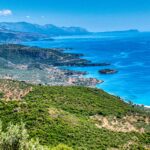
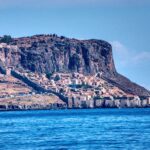
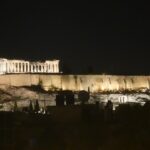

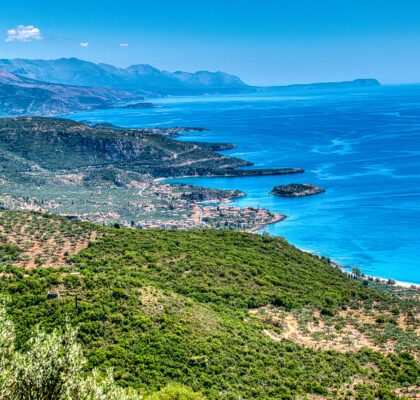
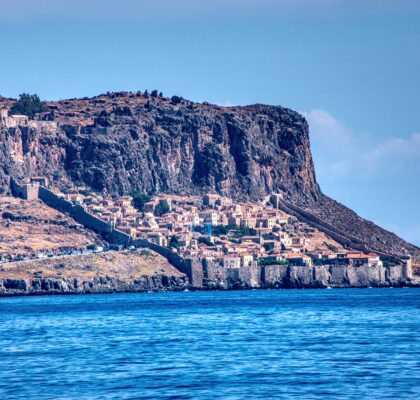
Pingback: Thessaloniki, Greece, June 2021 - Ali Karim Greece
Wow! Looks beautiful! Very informative.
Enjoy. You deserve the best.
Thanks for sharing your time and knowledge. Take care.
Regards,
Shamim.
Thanks, Shamim, for the feedback and the kind wishes for us.
Appreciate that.
We enjoy writing the blogs; it’s fun for us.
Thanks again and take care.
Very cool! Beautiful mosque. Thank you for sharing.
Thanks Noorallah for the feedback; glad you enjoyed it.
The Fetiye mosque was indeed nice to visit and enjoy.
Wow Ali we are always thrilled to see where you have been and love your photos and stories. Beautiful!!! Thanks for sharing.
Thanks so much for the warm feedback Mubina.
So glad you enjoy the blogs.
What beautiful scenery. OMG.
Loved the climb part to the monastery. The vows of the monk can teach us a few things especially about attachment to worldly things.
Interesting to see a mosque with across. True pluralism.
Thanks Mahamud; Good observation about Pluralism.
Thanks
Ali: to experience these places, you have to take me with you.
Have not heard of some of these cities.
You are blessed, stay blessed.
🙂
Indeed, we always count our blessings and give thanks always.
Thank you for the kind wishes
Hi Ali,
I’m glad to see you guys are doing well and travelling.
Thanks Marco; yes doing well.
Good place,thanks for share ,Ali👍
Most welcome Lin; glad you enjoyed it
Pingback: More Peloponnese, Greece, June 2021 - Greece